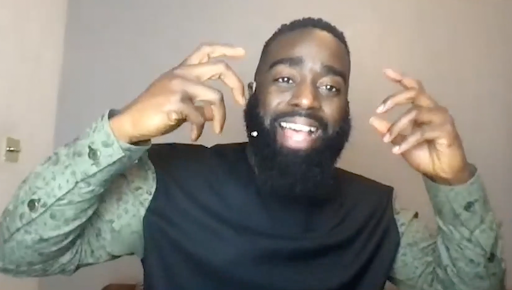Posted: 1st December 2021
Stories in Seville: Online workshops with Alim Kamara and Chené Swart
As part of our first transnational workshop in Seville, we enjoyed two online workshops from storytelling experts Alim Kamara and Chené Swart, who joined us to share their knowledge and experience of the power of stories.
Alim Kamara – ‘Stories and how to tell them’

Alim Kamara is a British-Sierra Leonean rapper and storyteller. As a child living in Sierra Leone, Alim would listen to Djelis (storytellers), admiring the way they weaved lessons through their tales. Stories quickly became central to his life, and when he moved to London and started his music career, he used this same technique to achieve number one singles in both Sierra Leone and Nigeria.
He established the Storie Storie organisation to share the traditional Sierra-Leonean folk tales of his childhood in the UK. Through the organisation, he performs and runs workshops through schools, businesses and festivals. Alim and his inspirational speakers share cultural and life stories that demonstrate success, disappointments, persistence and hard work. They share the tools that empower listeners to feel happy, express themselves and succeed.
Alim offered an online workshop to the group. His attitude, energy and spirit really entertained us! He presented how powerful storytelling can be if we use our body and voice when we tell a story. We can tell a story and we can be very still and the words that come out of our mouths can be powerful. And we can tell a story while changing our voice and using our body parts in ways to help the audience become part of this story, taking the scene of the story and the emotions to the audience. This can also be powerful and effective to communicate and make a message understood, especially when the words cannot capture the full story.
Storytelling improves focus and attention. It improves creativity and builds better communication skills. Storytelling also creates bonding. So, Alim gave us tips on how to become better storytellers and connect with an audience, showing them by performing them:
“Go beyond words when telling a story. Use emotions, movements and voice.”
“Face the monster and confront your fears.”
“Take the stinking thinking away. Stop thinking about what other people might think or say about you.”
“Challenge yourself, go on stage, dare.”
“It is ok not to be perfect. Keep practising and try to tell the stories you like to tell. Experiment with different storytelling methods and techniques.”
“Feel the audience.”
“Be authentic and be present.”
Chené Swart – ‘Reauthoring the world through your stories’

Chené has been translating Narrative Therapy ideas and practices with organisations, communities and individuals from various cultures and contexts for nearly 20 years. She is committed to participate in and contribute to conversations and actions that re-author our world towards the common good, one narrative at a time!
Chené started her session with powerful questions to show us how powerful stories can be. Stories live in relationships. We are in a relationship with nature, to one another, to our histories, and to all the things that matter to us. By exploring the answers to these questions, we identify stories that give us clues about who we are and what we really care about. These questions made it easy to find ourselves in relation to other things, elements and people but also use our imagination and express ourselves easier. Another great thing about these questions is that you can have the same conversation with the same people the next day and find other things to say.
Chené also introduced to us the two important capacities we have as humans. The first is that we give meaning to things, even to single words, and this meaning can change in a moment. The second is our capacity to connect to the dots of our lives and make a story. Starting from one word, we can go back to our memories and share a story about a particular life experience. This basically says that all our life experiences show us how we see the world and who we are.
If we can make meaning and we can take our life experiences and put them in line as we did in the timeline activity, we will see that we are many different stories. We make assumptions about who we are and on who other people might be when we listen to their stories. Which stories do you want to keep and grow? This is also a powerful question to think about who we want to be and what we want to do in life, today and in the future. This is how we can build alternative narratives for ourselves and the world we are living in.
She spoke about the importance of being the authors of our own stories and she gave us tips on how we can stop assuming other people’s stories and support them being the authors of their own stories by respecting them.
